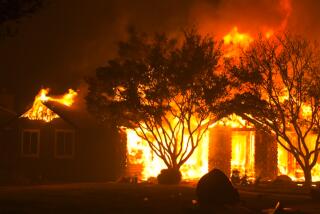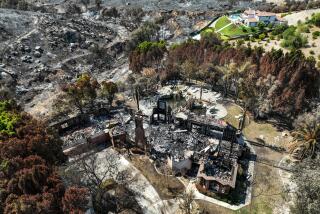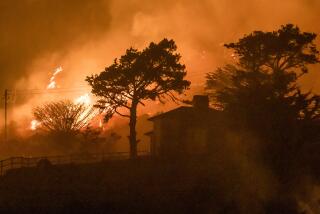Wait for adjuster deepens agony of damaged home
Some Central Floridians, already frustrated by delays in getting electricity, gasoline and other basic goods and services, are now caught in another waiting game, this time with their insurance company.
Four days after Hurricane Charley tore through Central Florida, some homeowners with damaged properties are getting busy signals when they try to call their insurer or are being told they will have to wait a week or two for an adjuster to arrive.
Others lack clear direction on how to proceed with repairs but worry that filing a damage claim will lead to higher premiums -- or the cancellation of their policy.
Insurers said Tuesday that their adjusters and agents are responding as quickly as possible to the avalanche of calls -- tens of thousands of claims have been filed across the state since the storm hit late Friday. But that’s little comfort to homeowners battling to keep rainwater, bugs and animals from entering the house through gaping holes in roofs, windows or walls.
Unable to reach anyone at the regional office of Liberty Mutual Insurance Co., Rae Grueninger decided to hire a tree service to remove the giant oak that had slammed into her Winter Park home and collapsed portions of the ceiling in her foyer and living room.
The tree service agreed to seek payment from Liberty Mutual, but Grueninger still worried that the insurer ultimately wouldn’t agree to pay for the tree’s removal or any subsequent repairs.
“If you can’t talk to your insurer, you don’t know what to do,” said the 68-year-old Grueninger, who has placed trash cans and a plastic swimming pool under the holes in her ceiling to catch the rainwater of recent days.
Homeowners for the first time are confronting the new, higher hurricane deductibles in their insurance policies.
The deductibles, approved by the state in the mid-1990s after Hurricane Andrew, now range from 2 percent to 5 percent of the insured value of the house. So a resident with a home valued at $100,000, for example, would have to pay the first $2,000 to $5,000 worth of damage before the policy’s coverage kicks in; the owner of a $500,000 home would be responsible for the first $10,000 to $25,000 in repairs.
Most of those interviewed Tuesday seemed resigned to the higher deductible, even if it means dipping into savings or taking out a loan to pay it. Many banks, including major players such as SunTrust, Bank of America and Washington Mutual, are already offering “hurricane special” finance options for victims of Charley.
The offers differ from bank to bank, so residents are encouraged to shop around. Some deals involve low- or no-interest personal loans, deferred credit-card payments, extended payment plans, expedited approval of a home-equity loan, or emergency home-equity lines of credit.
Juana Cabrera Bodre of Buenaventura Lakes said her insurance agent told her it would take as much as two weeks for an adjuster to arrive and survey the damage to her home, which lost the majority of shingles torn from its roof by Charley. The State Farm agent told her to cover the roof with tarps or plastic to prevent further damage from rain, but not to repair the roof before an adjuster could get there.
“My main concern is that they come see the damage as soon as possible, because that way I can borrow money or take out a loan to fix my house so that it doesn’t fall apart on us,” Cabrera said. “I just want them to pay attention to my situation.”
Kevin Craiglow, a spokesman for Nationwide, said the company has had problems with customers exaggerating the severity of their home’s damage, which delays the dispatch of adjusters to homes that really need repairs.
“It does no good to say your home is uninhabitable when it’s not and others are much worse condition than yours,” Craiglow said.
Homeowners who decide to undertake repairs before their agent or adjuster can survey their house should make sure the repairs are done by licensed businesses that carry their own insurance, to cut down on fraud and ensure that any subsequent problems are covered.
Robert Sullivan, another Winter Park resident, said he was planning to pay for the minor damage to his roof and the removal of fallen tree limbs out of pocket rather than file a claim with his insurer, State Farm.
“I’m sure they’re getting ready to cut back” on policies in Florida, now that a major hurricane has hit, Sullivan said. “Who are they going to cut back but people who file claims?”
Many homeowners remember that in the months and years after Andrew, which struck South Florida in August 1992, some insurers canceled many of their long-time policyholders and threatened to leave Florida entirely, citing the financial exposure posed by another major hurricane.
Despite the reforms that were adopted after Andrew, anecdotal reports circulate of companies dropping customers, sometimes after only one or two claims.
Insurers said there is a widespread misperception that homeowners’ policies are canceled for little or no reason. But at least one insurer acknowledged that some policyholders damaged by Charley may face a tough choice as they decide whether to file a claim.
“Certainly, if the damage is severe, you want to get it reported right away. That’s why you have insurance, for such cases,” State Farm spokesman Tom Hagerty said. “But if it is minor damage, the homeowner might want to consider whether they should pursue it or not. Everyone’s situation is different.”
Dorimar Mercado and Richard Burnett contributed to this report. Greg Groeller can be reached at 407-420-5471 or ggroeller@orlandosentinel.com.
More to Read
Sign up for Essential California
The most important California stories and recommendations in your inbox every morning.
You may occasionally receive promotional content from the Los Angeles Times.










